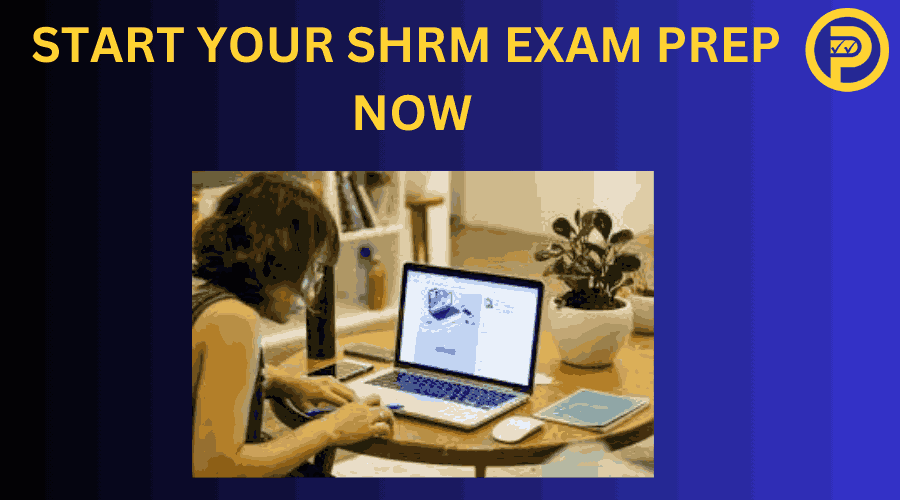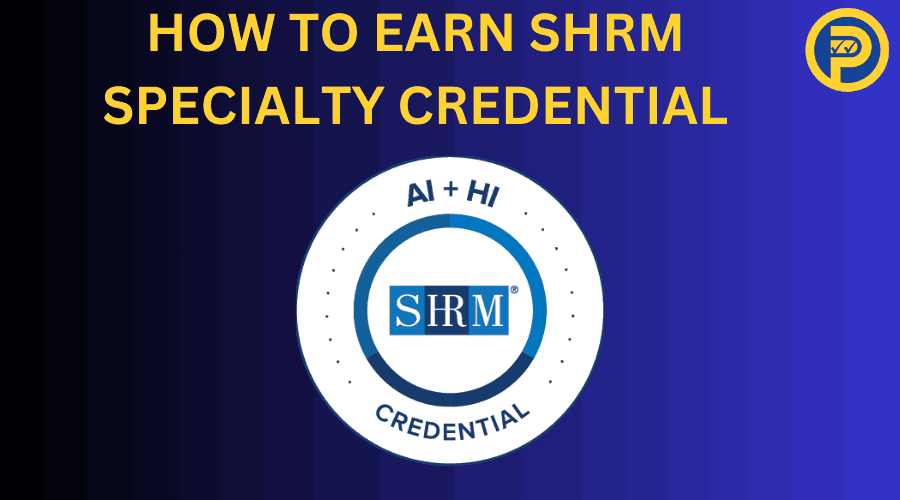The Society for Human Resource Management (SHRM) offers a range of specialty credentials designed to help HR professionals demonstrate specialized knowledge in various areas of human resource management. Earning a SHRM Specialty Credential not only enhances your professional credibility but also provides opportunities for career advancement.
What is a SHRM Specialty Credential?
A SHRM Specialty Credential is a recognition of competency-based professional development in a specific field of HR practice. It signifies that the individual has demonstrated specialized knowledge in complex and evolving areas, such as California HR Law or Talent Acquisition.
Upon earning the credential, practitioners receive a certificate of accomplishment and a digital badge to verify their specialty.
Additionally, those who hold SHRM-CP or SHRM-SCP certifications will have the associated Professional Development Credits (PDCs) automatically uploaded to their SHRM Certification Portal.
Importantly, SHRM Specialty Credentials do not expire and do not require recertification, allowing professionals to maintain their credentials indefinitely.
Find out: Does SHRM-CP Expire
Types of SHRM Specialty Credentials
SHRM offers a variety of specialty credentials that cater to specific areas within human resources. These credentials are designed to validate specialized knowledge and skills in complex and continually evolving topics, enabling HR professionals to enhance their expertise and credibility. Some of the notable SHRM Specialty Credentials include:
California Law HR
This credential emphasizes California labor laws and compliance requirements, which are notably complex due to the state’s unique legal landscape.
Objectives:
- Equip HR professionals with the knowledge needed to navigate California’s intricate labor regulations.
- Minimize potential litigation risks by understanding compliance obligations.
- Enable practitioners to operate high-performing, compliant businesses within California’s regulatory framework.
HR Department of One
Designed for HR professionals who manage all HR functions within small organizations or departments.
Objectives:
- Provide tools and strategies for effectively managing HR responsibilities in a limited-resource environment.
- Enhance skills in various HR functions, including recruitment, employee relations, and compliance.
- Foster a comprehensive understanding of how to align HR practices with organizational goals.
Inclusive Workplace Culture
Concentrates on creating and maintaining inclusive work environments that promote diversity and equity.
Objectives:
- Develop strategies for fostering an inclusive workplace culture.
- Understand the importance of diversity in enhancing organizational performance.
- Equip HR professionals with tools to address bias and discrimination effectively.
People Analytics
Covers data-driven decision-making in HR practices, emphasizing the use of analytics to improve workforce management.
Objectives:
- Teach HR professionals how to leverage data to inform talent management strategies.
- Enhance skills in interpreting workforce data to drive organizational performance.
- Promote a culture of evidence-based decision-making within HR functions.
People Manager Qualification (PMQ)
Aimed at enhancing the skills of managers overseeing teams, focusing on effective people management practices.
Objectives:
- Equip managers with essential leadership skills necessary for team success.
- Develop competencies in communication, performance management, and conflict resolution.
- Foster an understanding of how effective management contributes to overall organizational success.
Talent Acquisition
Focuses on effective recruitment strategies and practices that attract top talent.
Objectives:
- Provide insights into modern recruitment techniques and technologies.
- Enhance understanding of employer branding and candidate experience.
- Equip HR professionals with tools to develop comprehensive talent acquisition strategies.
Read about: 10 Reasons as to Why Companies Post Jobs if they Hire Internally
Total Rewards
Addresses compensation, benefits, and employee recognition programs as part of a holistic approach to employee rewards.
Objectives:
- Teach best practices for designing competitive compensation structures.
- Explore the impact of benefits on employee engagement and retention.
- Develop strategies for implementing effective recognition programs that motivate employees.
U.S. Employment Immigration
Provides knowledge on immigration processes relevant to employment in the United States.
Objectives:
- Equip HR professionals with an understanding of immigration laws affecting employment practices.
- Address compliance issues related to hiring foreign workers.
- Develop strategies for navigating the complexities of employment-based immigration processes.
Workplace Investigations
Teaches skills for conducting effective workplace investigations into employee complaints or misconduct.
Objectives:
- Provide methodologies for conducting impartial investigations while adhering to legal standards.
- Enhance skills in interviewing techniques and evidence collection.
- Equip practitioners with tools to document findings and make informed decisions based on investigation outcomes.
Check out: SHRM Investigation Questions
Workplace Mental Health Ally Certificate
Focuses on promoting mental health awareness in the workplace and supporting employees’ mental well-being.
Objectives:
- Raise awareness about mental health issues affecting employees.
- Provide strategies for fostering a supportive work environment that prioritizes mental health.
- Equip HR professionals with tools to identify signs of mental health challenges and offer appropriate support resources.

Eligibility Requirements for SHRM Specialty Credentials
To apply for a SHRM Specialty Credential, candidates must meet specific eligibility requirements that ensure they possess the necessary professional experience and educational background.
Professional Experience
Relevant work experience in HR or related fields is often a prerequisite for obtaining a SHRM Specialty Credential. Candidates need to demonstrate experience in strategic HR roles or specific functions related to the credential they are pursuing.
- Demonstrated Experience: Candidates should provide evidence of their work experience, showcasing how it aligns with the specialty area they wish to pursue. For example, someone applying for the Talent Acquisition credential should have experience in recruitment and selection processes.
- Strategic vs. Operational Roles: Depending on the specialty, candidates need to show that they have engaged in strategic HR activities, such as policy development and alignment of HR strategies with organizational goals. This is particularly relevant for credentials like People Analytics or Inclusive Workplace Culture.
Check Out: What Is the Entry Level Into Working in HR
Educational Background
While a formal degree may not be mandatory for all SHRM Specialty Credentials, having a foundational understanding of HR principles is beneficial.
- Degree Requirements: Some credentials may have specific educational prerequisites, while others may not require a degree at all. However, candidates with degrees in human resources or related fields often have an advantage.
- Understanding of HR Principles: Regardless of formal education, candidates should have a solid grasp of core HR concepts and practices relevant to their chosen specialty.
Check Out: HR Exams
Application Submission
Candidates must complete an online application that includes personal information, a current resume, and responses to open-ended questions about the significance and impact of obtaining the credential.
These responses typically include:
- Describing the significance of obtaining a SHRM Specialty Credential.
- Discussing the impact of earning the credential on their professional development.
- Demonstrating resiliency and the ability to navigate difficult situations.
Steps to Earn a SHRM Specialty Credential
Step 1: Choose Your Specialty
The first step is to determine which SHRM Specialty Credential aligns with your career goals and interests. Consider your current role, areas where you want to deepen your knowledge, and how the credential can enhance your professional development.
Step 2: Review Eligibility Criteria
Once you have selected a specialty, review the specific eligibility criteria associated with that credential. Ensure you meet the necessary professional experience and educational requirements before proceeding with your application.
Step 3: Complete the Application
To apply for a SHRM Specialty Credential, you will need to complete an online application that includes:
- Your contact information
- A current resume
- Responses to open-ended questions regarding the significance and impact of obtaining the credential
It’s important to print your application for your records before submitting it, as SHRM will not return it once submitted.
Step 4: Pay the Application Fee
There may be an application fee associated with your credential program. This fee varies depending on the specific specialty credential you are pursuing.
Check out: Fees for various specialty credentials
Step 5: Complete Required Learning Components
After your application is approved, you will need to engage in content-specific education related to your chosen specialty. This may involve:
- Attending workshops or seminars
- Completing online courses
- Participating in webinars
The learning components are designed to equip you with specialized knowledge pertinent to your area of focus.
Step 6: Pass the Assessment
Upon completing the required learning components, you will need to pass an online assessment specific to your specialty credential. The assessment consists of multiple-choice questions that test your understanding and application of the material covered in the learning modules.
Related: What is the Best Way to Prepare for the SHRM?
Benefits of Earning a SHRM Specialty Credential
Obtaining a SHRM Specialty Credential offers numerous advantages for HR professionals:
- Enhanced Credibility: Earning a specialized credential demonstrates your commitment to professional development and expertise in your chosen area.
- Career Advancement: Specialized knowledge can lead to increased job opportunities and promotions within organizations that value targeted competencies.
- Networking Opportunities: Being part of the SHRM community allows you to connect with other professionals who share similar interests and challenges in HR. View: How Much Is SHRM Membership
- Professional Development Credits (PDCs): Completing a specialty credential earns PDCs that can be applied toward maintaining other SHRM certifications like SHRM-CP or SHRM-SCP.
- Digital Badges: The digital badge received upon completion can be shared on social media platforms like LinkedIn, showcasing your achievement to potential employers and peers.
- Evergreen Status: Once earned, SHRM Specialty Credentials do not expire; however, they cannot be recertified after three years without completing updated learning components again.
How to Maintain SHRM Specialty Credentials
While SHRM Specialty Credentials do not expire, they cannot be recertified once obtained. If updates or changes occur within the specialty area, you may need to complete an updated learning program to receive a new credential after three years from their initial completion date.
FAQS
Is SHRM SCP Certification Worth It?
The SHRM-SCP certification is highly regarded and worth pursuing for HR professionals. It enhances your credibility, demonstrates strategic HR expertise, and can lead to significant career advancement. Certified individuals often report salaries that are 35% higher than their non-certified peers.
While there are costs associated with obtaining the certification, the potential benefits in terms of job opportunities and salary increases outweigh these expenses, making it a valuable investment in your career.
Do SHRM Specialty Credentials Expire?
No, SHRM specialty credentials do not expire. Once obtained, these credentials are considered evergreen and do not require recertification. This allows HR professionals to maintain their specialized knowledge without the need for ongoing renewal, making them a valuable asset in demonstrating expertise in specific HR areas.
How Long Does it Take to Study for the SHRM SCP exam?
Most candidates spend between 41 to 80 hours preparing for the SHRM-SCP exam. This preparation time is generally sufficient for peak performance, as research indicates that spending this amount of time correlates with higher pass rates.
However, individual study needs may vary, so it's important to assess your own knowledge and understanding of the material before determining your study plan.

